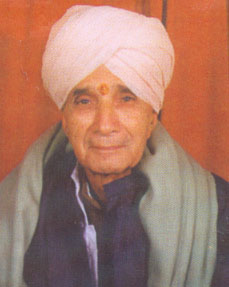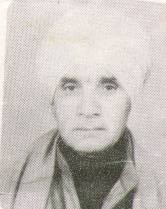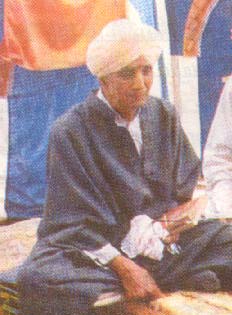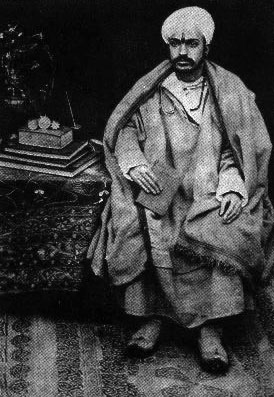Pandit Prem
Nath Shastri
Epitome of KP
Identity
By Vijay Tikoo

Pandit Prem Nath Shastri
In
his last words Pandit Prem Nath Shastri attributes
the success of his ‘Vijyeshwar Panchang’ to
not as much to his own efforts but the
overwhelming support of the Kashmiri Pandit
Community. These words from a man who knew that
his death was not far away convey both a sense of
accomplishment as well as feeling gratitude Pandit
Prem Nath had reluctantly agreed to give up the
job in state education department after completing
his education and join his father and Guru Pandit
Aftab Sharma to bring out the Kashmiri Panchang
‘Vijyashwari Jantri’ now a household name
amongst Kashmiri Pandits.
In
fact ‘Vijyeshwar Panchang’ over the years has
become one of the most important guides for the
Kashmiri Pandit Community in their day to day
socio-religious dealings. Not that Kashmiri Pandit
Community did not have alternative ‘Panchangs’
to adopt. In fact Brahman Maha Mandal of Kashmir
for quite sometime has been taking out a
‘Panchang’ which many Kashmiri scholars opined
was more accurate. Yet the Pandit Community almost
through a silent consensus chose ‘Vijyeshwar
Jantri’ as a guide in their socio-religious
dealings. Perhaps for its better presentability
and simple language. Or with this confidence that
the family of Prem Nath Shastri had carried on
this task for three centuries and shall ensure its
continuity in the future as well.
Pandits
recognise ‘Vijyeshwar Jantri’ as one of the
most important institutions for maintaining their
identity during such times when pressures for
dissolution of the same are multiplying.
Pandit
Prem Nath Shastri’s role during his life time
did not remain confined to just carrying ahead a
family tradition but in institutionalising it in
such a way that its relevance in the social life
of Kashmiri Pandits only increased with each day.
During the years in exile, ‘Vijyeshwar Jantri’
became the most important instruments for Kashmiri
Pandit to holding on to his identity. When the
news of the demise of Pandit Prem Nath Shastri
broke out, displaced Pandits received it with a
stunning silence. Pandit Prem Nath Shastri
through ‘Vijyeshwar Jantri’ and numerous other
works endeavoured to protect Kashmiri Pandit
identity and with his demise people feel as if a
fulcrum around which they could rebuild their
socio-cultural fabric in exile was lost.
During
the years after the forced exodus of Kashmiri
Pandits in 1989, Sh Prem Nath Shastri had become
acutely conscious and concerned about the dangers to the cultural identity of Kashmiri Pandits in
exile. ‘Our ritual traditions have become as
important as they were never before. Not in their
negative degenerated form, but in their positive
essence. Our traditions will hold us together in
exile,” he once said to us while thinking aloud
on the tragedies that befell upon Kashmiri Pandits.
Not surprisingly, he undertook the arduous task of
commenting and explaining the main ritual
traditions of Kashmiri Pandits. He brought out
small booklets, audio cassettes on the
significance and performance of almost all
important religious traditions and rituals of
Kashmiri Pandits. These capsules like Karam Kand
Deepak, Shivratri Puja, Sandiya, Antim Sanskar,
Janam Din Puja has had a marked impact on the
Kashmiri Pandit Social life in exile. While as in
the Valley such ritual traditions were the forte
of only a small section of ‘Gaurs’-the
priestly class of Kashmiri Brahmins, in exile
through these simplified and written and audio
capsules practice of the ritual traditions has
become possible for one and all. Very gradually
the families of displaced Kashmiri Pandits have
become active participants in their religious
traditions. The simple and erudite expositions of
Shastri Ji both in written and audio forms on such
works like Panchastavi, Bhawani Sahsranama,
Mahimnapaar, Bhagwat Geeta, verses of Lal Ded have
been a profound attempt to bring the spiritual
tradition of Kashmiri Pandits within the reach of
the displaced Hindu society from Kashmir.
to the cultural identity of Kashmiri Pandits in
exile. ‘Our ritual traditions have become as
important as they were never before. Not in their
negative degenerated form, but in their positive
essence. Our traditions will hold us together in
exile,” he once said to us while thinking aloud
on the tragedies that befell upon Kashmiri Pandits.
Not surprisingly, he undertook the arduous task of
commenting and explaining the main ritual
traditions of Kashmiri Pandits. He brought out
small booklets, audio cassettes on the
significance and performance of almost all
important religious traditions and rituals of
Kashmiri Pandits. These capsules like Karam Kand
Deepak, Shivratri Puja, Sandiya, Antim Sanskar,
Janam Din Puja has had a marked impact on the
Kashmiri Pandit Social life in exile. While as in
the Valley such ritual traditions were the forte
of only a small section of ‘Gaurs’-the
priestly class of Kashmiri Brahmins, in exile
through these simplified and written and audio
capsules practice of the ritual traditions has
become possible for one and all. Very gradually
the families of displaced Kashmiri Pandits have
become active participants in their religious
traditions. The simple and erudite expositions of
Shastri Ji both in written and audio forms on such
works like Panchastavi, Bhawani Sahsranama,
Mahimnapaar, Bhagwat Geeta, verses of Lal Ded have
been a profound attempt to bring the spiritual
tradition of Kashmiri Pandits within the reach of
the displaced Hindu society from Kashmir.
Shastri
Ji also understood very well the importance of
preserving the Kashmiri language for the survival
of Kashmiri Pandits as a distinct entheno-religious
group. In all his public discourses and social
interactions Pandit Prem Nath Shastri would urge
the new generation to speak Kashmiri language, and
transmit it to the coming generations. He also
wanted the digeneous script for Kashmir to be
revived. In fact his ‘Sharda Primer’
has been one of the few attempts to revive
‘Shardha Script’ amongst Kashmiri Pandits.
In
his day to day living Shastri Ji was an epitome of
traditional Kashmiri Pandit living. He always wore
the traditional Kashmiri Pandit Pheren and the
turban. His living room reflected not only the
style but also the discipline of a Kashmiri
Brahmin scholar. No chairs, arrangement of books
on the rack, his writing desk, everything bore a
traditional mark, besides his strict working
schedule. But most significant was his own
personality which was typically a Kashmiri Pandit
type.
The
glow on his face, inquisitiveness of eyes, soft
but stern voice and the aura of discipline. He
appeared deeply orthodox by looks. But just a
small conversation with him would convince about
his flexibility of thought.

During
his last days he had developed taste for listening
to the ‘audio cassettes’ of Osho. His son had
to purchase Rs 10,000 worth cassettes which Pandit
Shastri would listen while fighting his disease.
‘He (Osho) has been misunderstood by the people
of India. But I am a Kashmiri Brahmin. I cannot
deny him his due,’ he would tell his family
during his last days.
One
of the last wishes of Pandit Prem Nath Shastri had
been to publish a ‘Panchang’ for Jammu. Most
of the work on the same has been already completed
under his supervision. His sons as a tribute to
him are going to bring out the first issue of
‘Ranvireshwar Panchang’ very soon. When one of
us pointed out to the eldest son of Pandit Shastri
that the mantle of the social and religious
responsibility, which Shastri Ji had carried on
his shoulders, now fell on him, he was overwhelmed
and said with moist eyes in all humility, “I am
feeling the weight. But I will do my best with
your co-operation”.
Source: Kashmir
Sentinel - Publication of Panun
Kashmir
|










 to the cultural identity of Kashmiri Pandits in
exile. ‘Our ritual traditions have become as
important as they were never before. Not in their
negative degenerated form, but in their positive
essence. Our traditions will hold us together in
exile,” he once said to us while thinking aloud
on the tragedies that befell upon Kashmiri Pandits.
Not surprisingly, he undertook the arduous task of
commenting and explaining the main ritual
traditions of Kashmiri Pandits. He brought out
small booklets, audio cassettes on the
significance and performance of almost all
important religious traditions and rituals of
Kashmiri Pandits. These capsules like Karam Kand
Deepak, Shivratri Puja, Sandiya, Antim Sanskar,
Janam Din Puja has had a marked impact on the
Kashmiri Pandit Social life in exile. While as in
the Valley such ritual traditions were the forte
of only a small section of ‘Gaurs’-the
priestly class of Kashmiri Brahmins, in exile
through these simplified and written and audio
capsules practice of the ritual traditions has
become possible for one and all. Very gradually
the families of displaced Kashmiri Pandits have
become active participants in their religious
traditions. The simple and erudite expositions of
Shastri Ji both in written and audio forms on such
works like Panchastavi, Bhawani Sahsranama,
Mahimnapaar, Bhagwat Geeta, verses of Lal Ded have
been a profound attempt to bring the spiritual
tradition of Kashmiri Pandits within the reach of
the displaced Hindu society from Kashmir.
to the cultural identity of Kashmiri Pandits in
exile. ‘Our ritual traditions have become as
important as they were never before. Not in their
negative degenerated form, but in their positive
essence. Our traditions will hold us together in
exile,” he once said to us while thinking aloud
on the tragedies that befell upon Kashmiri Pandits.
Not surprisingly, he undertook the arduous task of
commenting and explaining the main ritual
traditions of Kashmiri Pandits. He brought out
small booklets, audio cassettes on the
significance and performance of almost all
important religious traditions and rituals of
Kashmiri Pandits. These capsules like Karam Kand
Deepak, Shivratri Puja, Sandiya, Antim Sanskar,
Janam Din Puja has had a marked impact on the
Kashmiri Pandit Social life in exile. While as in
the Valley such ritual traditions were the forte
of only a small section of ‘Gaurs’-the
priestly class of Kashmiri Brahmins, in exile
through these simplified and written and audio
capsules practice of the ritual traditions has
become possible for one and all. Very gradually
the families of displaced Kashmiri Pandits have
become active participants in their religious
traditions. The simple and erudite expositions of
Shastri Ji both in written and audio forms on such
works like Panchastavi, Bhawani Sahsranama,
Mahimnapaar, Bhagwat Geeta, verses of Lal Ded have
been a profound attempt to bring the spiritual
tradition of Kashmiri Pandits within the reach of
the displaced Hindu society from Kashmir.






No one has commented yet. Be the first!